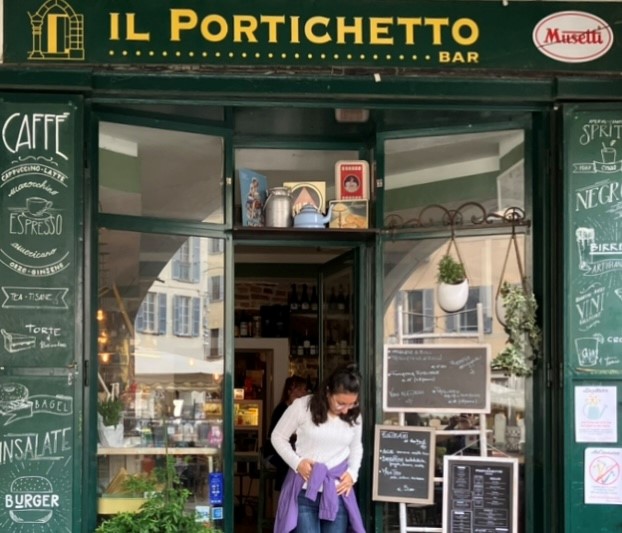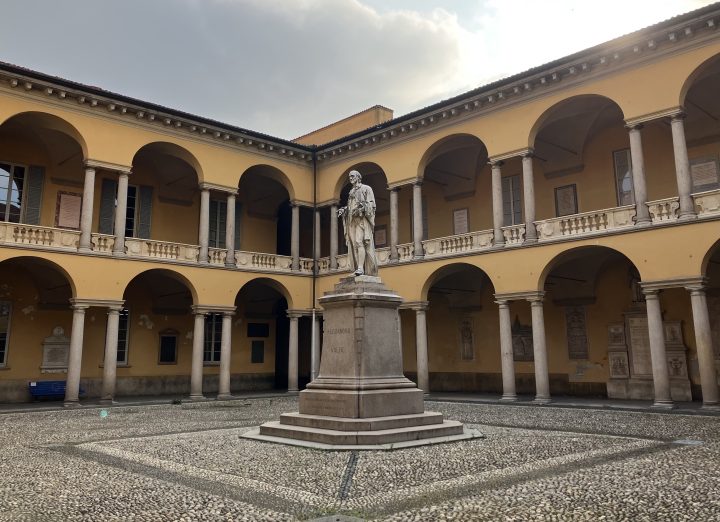Mama mia, sono in Italia! My EC2U adventur-a at the University of Pavia!
Would you like to experience a relatively less-known European city with an amazing university in it? Do you want to discover a new way of academic thinking? Would you like to be a part of the mosaic of the European culture? Are you curious to meet new people you will learn from, and acquire new communication skills? Check out the blog to see how you can do all these with a short-term EC2U mobility!
Ciao a tutti! My name is Selcen Erten, and I am a PhD researcher at the University of Turku. I have been to the University of Pavia, Italy, and the University of Poitiers, France, through short-term EC2U mobility. In this blog, I will talk about what EC2U mobility program is. I will tell how my EC2U experience was in Italy. I will also share how you can benefit from it as someone affiliated with the University of Turku. As I am very much into languages and come from linguistics background, I will also give some key features of Italian language.
My short-term EC2U mobility at the University of Pavia was an intensive PhD course which was the 2nd edition of machine learning techniques & text processing tools applied to the study of linguistic diversity & cultural perceptions. It lasted for 3 days. As for my mobility at the University of Poitiers, it was about learning a language with a different alphabet, and it lasted for 5 days. I had great experiences both at Pavia and Poitiers, but for practical reasons, I will only focus on Pavia in this blog. (I encourage you to check out my blog about my mobility at the University of Poitiers and my reflections on learning a different-alphabet language with a focus on Greek and Cyrillic).
What is EC2U?
EC2U – European Campus of City Universities is a pan-European multi-cultural and multi-lingual alliance of 7 universities: Friedrich Schiller University of Jena (Germany), University of Alexandru Ioan Cuza of Iași (Romania), University of Coimbra (Portugal), University of Pavia (Italy), University of Poitiers (France), University of Salamanca (Spain) and University of Turku (Finland).
According to ec2u.eu, EC2U gathers about 160 000 students and 20 000 administrative staff, teachers and researchers. The activities of the alliance are based on good health and well-being, quality education and sustainable cities and communities, among many others. One of the main aims of EC2U is overcoming cliched views of regional and national identities. In short-term mobilities, EC2U provides academic opportunities at the universities of the alliance and unique chances to experience the culture with the cultural activities.
On a wider scale, EC2U has also joint master’s programmes in Lifelong Well-Being and Healthy Ageing, in Sustainable Cities and Communities, and in European Languages, Cultures and Societies in Contact.
One of the 7: Pavia and the University of Pavia
Located in Lombardy region of Italy, Pavia is a must-see mediaeval town where Charlemagne was coronated, Alessandro Volta studied, and Einstein spent two summers when he was young. As for the University of Pavia, there is evidence of teaching as early as 1361, which makes it one of the oldest universities not only in Europe but also in the world!
The University of Pavia has an amazing atmosphere which takes you back to centuries ago. You feel the history to your bones when you have your sessions in those historical buildings and classrooms even when you are there for only a couple of days. Being a very old university is not the only thing which makes the University of Pavia special. Pavia is also among the best 300 universities in the world!
My short-term mobility at the University of Pavia
The program included academic sessions (lectures, practicals and reflections/discussions), coffee breaks, dinners together and two culture trips. Professors who work at EC2U universities give the lectures during the mobility. It is not uncommon to listen to a lecture given by a professor whose books you read and even made references to in your studies.
Practicals are great chances to practice skills and acquire new ones with the students coming from other alliance universities. To me, one of the best parts of the mobility is the reflections/discussions where you can find a chance to interact with the professors and other students about your research area and topic as well as theirs. Coffee breaks and dinners are nice intervals where you can socialize and try local coffees and food.
As for the culture trips, all I can say is that they are great. The EC2U team at University of Pavia provided us with two different knowledgeable local guides for the two culture trips: With a guide, we had a city tour in one afternoon where we learnt a lot about the history of Pavia. In another afternoon, we visited Certosa di Pavia which is located between Pavia and Milan. Certosa di Pavia is one of the largest monasteries in Italy and Europe dating back to the 15th century. We learnt that there are still monks living there who took a vow of silence, and it made us think how many days of silence we could manage. Hmm, I believe I could try ‘un periodo di sette giorni’.
Speaking of Italy and Pavia, shall we have a look at the Italian language? Iniziamo!
Italiano
Fiasco, motto, stiletto, mafia, propaganda, paparazzi, confetti… No, I was just giving a few examples of loan words from Italian in … Turkish! Are they the same in your native language? If so, they are probably not even the most well-known Italian loan words!

Café Il Portichetto on the famous square Piazza della Vittoria, Pavia.
Italian is a member of the Italo-Dalmatian branch of the Romance language family. Here are some key features of this beautiful language:
- Italian is a relatively phonetic language, which means that words are generally pronounced as they are spelled. Italian is also often referred to as one of the most musical languages because of its melodic nature. No wonder its musicality suits music and poetry a lot!
- There is a strong tendency for Italian words to end in vowels, and maybe this is one of the reasons why Italian has this appealing pronunciation. Only the international words such as film, show, toast end in consonants, but even then, the final letter is pronounced so strongly that it almost sounds like there is an extra vowel out there!
- It has a rich vocabulary derived from Latin. Being a Romance language, Italian also shares a lot of lexical similarities with the other Romance languages of Spanish, French, Portuguese and Romanian.
- Italy has historically had an extremely diverse variety of Romance dialects. Today it is still the case for the Italian dialects of Italy. It is so the case that mutual intelligibility between some regions in Italy is not even possible!
- Italians are known for their hand gestures and body language that they use to enhance communication. When you think about tens of different hand gestures Italians daily use while speaking, seeing and listening to Italian language on the streets or on the campus is a feast to the eyes as well as ears!
- Italian has given so many words to other languages. Some are relatively less-known words like the ones mentioned above. Some are more known coming from the fields of literature (sonnet, comedy, novella), art (fresco, sculpture, renaissance), music (opera, soprano, maestro), food (pizza, pasta, risotto), coffee (espresso, latte, macchiato and many more. I would specifically suggest marocchino because it is pure bliss!) and desserts (tiramisu, panna cotta and of course gelato).
With the taste of tiramisu, panna cotta and gelato in our mouths, let’s talk about how you can benefit from EC2U.
How to apply for EC2U mobility?
I would like to start by telling how I was introduced to EC2U at the first place. It all started by seeing an email sent to us about the mobility at the University of Pavia. Honestly, I did not know much about EC2U back then, but checking out the eligibility criteria and the program of the course, I decided to give it a shot. So, one way to be aware of EC2U mobilities is to pay attention to the e-mails sent to you. Another way is to check EC2U news on UTU intranet.
The application for the mobility at Pavia I made was through google docs where I filled in a form and attached a few documents related to my research. In the application, it is important to show why you are interested in the mobility and how you will benefit from it. I would suggest reading enough about the alliance and the host university beforehand. Show in the application how the mobility connects to your studies.
Application process
After I made my application, I waited for it to be processed. This waiting time might sound like a long time, but in fact it is not more than a few weeks. The coordinators are punctual. They inform you about the decision in the time that they said they would. I received the positive result through an email where I was asked to confirm my final decision. At this point, I was already in contact with the EC2U office of UTU. I informed them that I was accepted for the mobility at Pavia for that duration of 3 days. They provide you with a travel grant for your EC2U mobility, and they did the same to me. The grant covers travel dates in addition to the actual duration of the mobility. For example, it was 1+3+1 days in my case.
EC2U Grant
Then you need to ‘accept’ the grant on the UTU forms in your UTU account. The amount of the travel grant depends mainly on how many days you will spend for the mobility. In my case, it was enough to cover the expenses of flight tickets, accommodation, transportation and food if. If you manage your budget well enough, you can even visit a nearby city in the country you are going to. For example, Pavia is a 30-min train ride away from Milan, so I got to spend some time there.
In short, travel grant given for the EC2U mobility sufficiently covers the expenses related to the mobility. It is important to underline also that the grant is put in your bank account before the mobility. I would not suggest waiting for the grant to buy the flight tickets. However, having the grant before the mobility is convenient in any case. After the mobility, you need to send the certificate of participation to the EC2U office at UTU within 1 month after the mobility is over. No worries about the ‘paperwork’, since the EC2U office at UTU is very helpful, and they smoothly guide you through the digital paperwork.
So why should you do short-term EC2U mobility?
Why should you consider doing EC2U? I will answer this question with my ever-classic answer: Why not? Do you want to experience a relatively less-known European city with an amazing university in it? Are you curious to discover a new way of academic thinking? Why not be a part of the mosaic of the European culture? Would you like to meet new people you will learn from? Do you want to acquire new communication skills?
You can find the links below which will make your E-C-2-U experience extra ea-sy-to-you:
European Campus of City-Universities EC2U | University of Turku (utu.fi)
For the master’s degree EC2U programmes at the University of Turku, check out the following links:
Master’s Degree Programme in European Languages, Cultures and Societies
Master’s Degree Programme in Sustainable Cities and Communities

